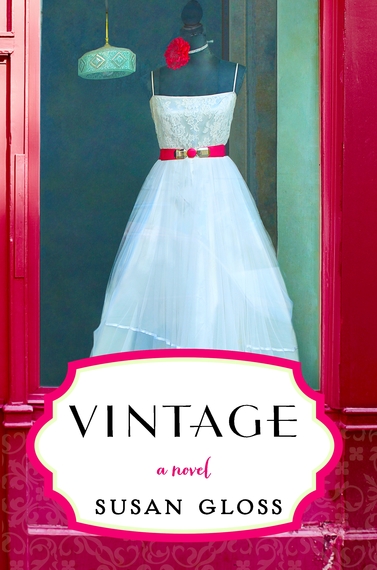Susan Gloss is the author of the debut novel VINTAGE (William Morrow/HarperCollins), a charming story about friendship set in a vintage clothing shop. Each item of clothing has a story behind it and so do the women who find themselves drawn together in this emotionally complex and beautiful novel. Gloss let us into the world she created for VINTAGE and all the "what ifs" she found along the way.
Tell us the story behind the story. How did VINTAGE come to be?
The idea for the novel grew from many hours spent in thrift stores, antique shops, and flea markets. At first, I was buying a lot of items from those places, simply because they fascinated me -- a box of baby clothes from the 1950s, a pair of Ferragamo shoes in a size I could never wear. At some point, my storage space and my cash flow couldn't take this "fascination" anymore. So instead of compiling items, I began compiling the stories I imagined they contained. My husband and I joke that, if I hadn't written VINTAGE, I would have ended up on the TV show Hoarders.
What was the most challenging aspect of writing VINTAGE?
Writing from multiple points of view. Each shift in viewpoint is also a shift in generation and background. There's Violet, a divorced shop owner in her late thirties, April, a pregnant teenager, and Amithi, an Indian-American woman facing an empty nest. Getting each of these characters' voices right, without letting one story drown out the others, was a balancing act.
What is the message you want readers to take away from your book?
At its heart, Vintage is a story about second chances. In our consumer culture, there's an emphasis on whatever is new and flashy and unblemished. We use things up and throw them away. The same "use and toss" attitude ends up getting applied to people, too. With this novel, I wanted to explore the idea that a person's history and imperfections make her beautiful, just like with a vintage gown.
Describe your writing schedule. Do you outline? Any habits?
My only true writing habit is coffee, and lots of it. I write whenever I can, wherever I can -- early mornings, late nights and weekends. I have a toddler at home, so I often have to get out of the house to make any real progress on a manuscript. I spend a lot of time at coffee shops and know what time all the ones in my neighborhood close.
What books are on your nightstand? What are you currently reading?
Right now I'm reading Bread & Butter by Michelle Wildgen, a novel about three brothers, two restaurants, and all the back of the house drama that unfolds when customers are out of earshot. I have to make sure I don't pick it up on an empty stomach, though. The food descriptions are incredibly vivid.
Next up is Fallen Beauty by Erika Robuck, a historical novel about the poet Edna St. Vincent Millay. I'm a sucker for stories about the lives of writers.
Which authors inspire you?
Emma Donoghue for her incomparable ability to keep readers turning the pages, Jhumpa Lahiri for her heartbreakingly beautiful prose, Isabel Allende for the magical worlds she creates, and Helen Fielding for laugh-out-loud humor.
What have you learned from this experience?
Writing a novel is a solitary experience, but the process of launching it out into the world shouldn't be. I've been lucky to be part of a group blog for first-time authors called The Debutante Ball. The blog is in its seventh year, and past members include bestselling authors Sarah Jio, Eleanor Brown, and Sarah Pekkanen. Every September the torch gets passed to a new batch of five debut authors. The group has been a lifeline for me while riding the ups and downs of publishing a first book. Each of the five "debs" posts once a week on the blog, but the real value takes place behind the scenes, where we have daily sanity checks via email.
What is your advice for aspiring writers?
My advice for writers comes from a Wallace Stevens quote I have framed next to my desk: "After the final no there comes a yes/And on that yes the future world depends."
What is the best piece of advice you have ever been given?
My grandfather told me that the most important skill is learning how to listen. He was right. And I'm still learning.
What are you working on now?
I'm working on a second novel, a standalone title set in the wine country of Spain. It's slated to come out in summer of 2015.
Joan Didion famously explained that she writes "entirely to find out what I'm thinking, what I'm looking at, what I see and what it means. What I want and what I fear." Why do you write?
I write because I have a very busy mind. I'm constantly asking "what if?" On the page, I can explore the "what ifs" in a productive way, rather than simply letting them spin around, gerbil-wheel style, in my head.
Susan can be found at her online vintage shop Cleverly Curated, or on her personal blog, GlossingOverIt. She also blogs every Wednesday at The Debutante Ball for debut authors.


